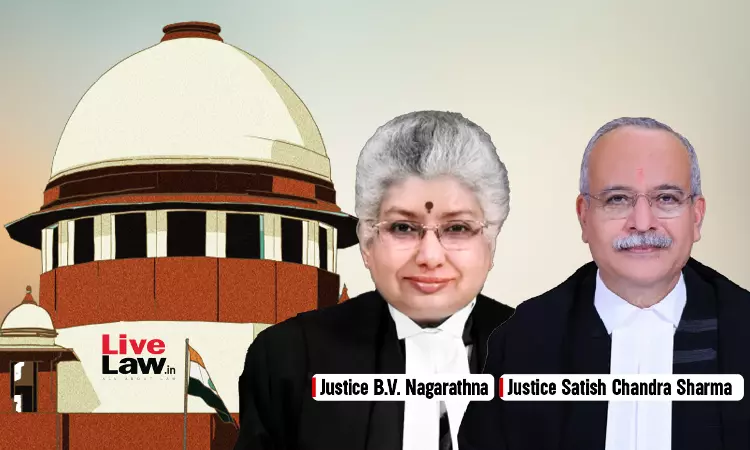- Home
- /
- Supreme court
- /
- Victims Of Offences Can File Appeal...
Victims Of Offences Can File Appeal Against Acquittal u/s 372 CrPC Even If They Aren't Complainants: Supreme Court
LIVELAW NEWS NETWORK
6 Jun 2025 10:40 AM IST
The Supreme Court has held that "victim" of an offence has the right to file an appeal against the acquittal of the accused as per the proviso to Section 372 of the Code of Criminal Procedure (corresponding to Section 413 of the Bharatiya Nagarik Suraksha Sanhita), irrespective of whether they are the complainant or not.In other words, even if the victims themselves have not filed the...
The Supreme Court has held that "victim" of an offence has the right to file an appeal against the acquittal of the accused as per the proviso to Section 372 of the Code of Criminal Procedure (corresponding to Section 413 of the Bharatiya Nagarik Suraksha Sanhita), irrespective of whether they are the complainant or not.
In other words, even if the victims themselves have not filed the complaint, they can appeal against the acquittal of the accused by invoking the proviso to Section 372 CrPC.
A bench comprising Justice BV Nagarathna and Justice Satish Chandra Sharma observed :
"The proviso to Section 372 of the CrPC was inserted in the statute book only with effect from 31.12.2009. The object and reason for such insertion must be realised and must be given its full effect to by a court. In view of the aforesaid discussion, we hold that the victim of an offence has the right to prefer an appeal under the proviso to Section 372 of the CrPC, irrespective of whether he is a complainant or not. Even if the victim of an offence is a complainant, he can still proceed under the proviso to Section 372 and need not advert to sub-section (4) of Section 378 of the CrPC."
The bench made this significant observation while holding that a complainant in a cheque dishonour case under Section 138 of the Negotiable Instruments Act is a "victim" witihn the meaning of Section 2(wa) of the CrPC (corresponding to Section 2(y) BNSS), who can file appeal agianst the acquittal of the accused as per Section 372 proviso CrPC.
The Court noted that the definition of "victim" has been couched in broad terms and Section 372 gives an absolute right to the victims to file an appeal without any conditions.
The bench explained the reasons for its conclusions as follows :
Firstly, the victim of a crime must have an absolute right to prefer an appeal which cannot be circumscribed by any condition precedent. In the instant case, a victim under Section 138 of the Act, i.e., a payee or the holder of a cheque is a person who has suffered the impact of the offence committed by a person who is charged of the offence, namely, the accused, whose cheque has been dishonoured.
Secondly, the right of a victim of a crime must be placed on par with the right of an accused who has suffered a conviction, who, as a matter of right can prefer an appeal under Section 374 of the CrPC. A person convicted of a crime has the right to prefer an appeal under Section 374 as a matter of right and not being subjected to any conditions. Similarly, a victim of a crime, whatever be the nature of the crime, unconditionally must have a right to prefer an appeal.
Thirdly, it is for this reason that the Parliament thought it fit to insert the proviso to sub-section 372 without mandating any condition precedent to be fulfilled by the victim of an offence, which expression also includes the legal representatives of a deceased victim who can prefer an appeal. On the contrary, as against an order of acquittal, the State, through the Public Prosecutor can prefer an appeal even if the complainant does not prefer such an appeal, though of course such an appeal is with the leave of the court. However, it is not always necessary for the State or a complainant to prefer an appeal. But when it comes to a victim's right to prefer an appeal, the insistence on seeking special leave to appeal from the High Court under Section 378(4) of the CrPC would be contrary to what has been intended by the Parliament by insertion of the proviso to Section 372 of the CrPC.
Fourthly, the Parliament has not amended Section 378 to circumscribe the victim's right to prefer an appeal just as it has with regard to a complainant or the State filing an appeal. On the other hand, the Parliament has inserted the proviso to Section 372 so as to envisage a superior right for the victim of an offence to prefer an appeal on the grounds mentioned therein as compared to a complainant.
Fifthly, the involvement of the State in respect of an offence under Section 138 of the Act is conspicuous by its absence. This is because the complaint filed under that provision is in the nature of a private complaint as per Section 200 of the CrPC and Section 143 of the Act by an express intention incorporates the provisions of the CrPC in the matter of trial of such a deemed offence tried as a criminal offence. Therefore, the complainant, who is the victim of a dishonour of cheque must be construed to be victim in terms of the proviso to Section 372 read with the definition of victim under Section 2(wa) of the CrPC.
Also from the judgment -Complainant In S.138 NI Act Case Can File Appeal Against Acquittal As 'Victim' Under S.372 Proviso CrPC : Supreme Court
Appearances - For petitioner - Mr. Antony R. Julian, Adv, Danish Zubair Khan, AoR, and Ms.V.R.Swetha Naidu, Adv
For respondents : G Sivabalamurugan, Advocate
Case : M/s Celestium Financial v A Gnanasekaran
Citation : 2025 LiveLaw (SC) 666



